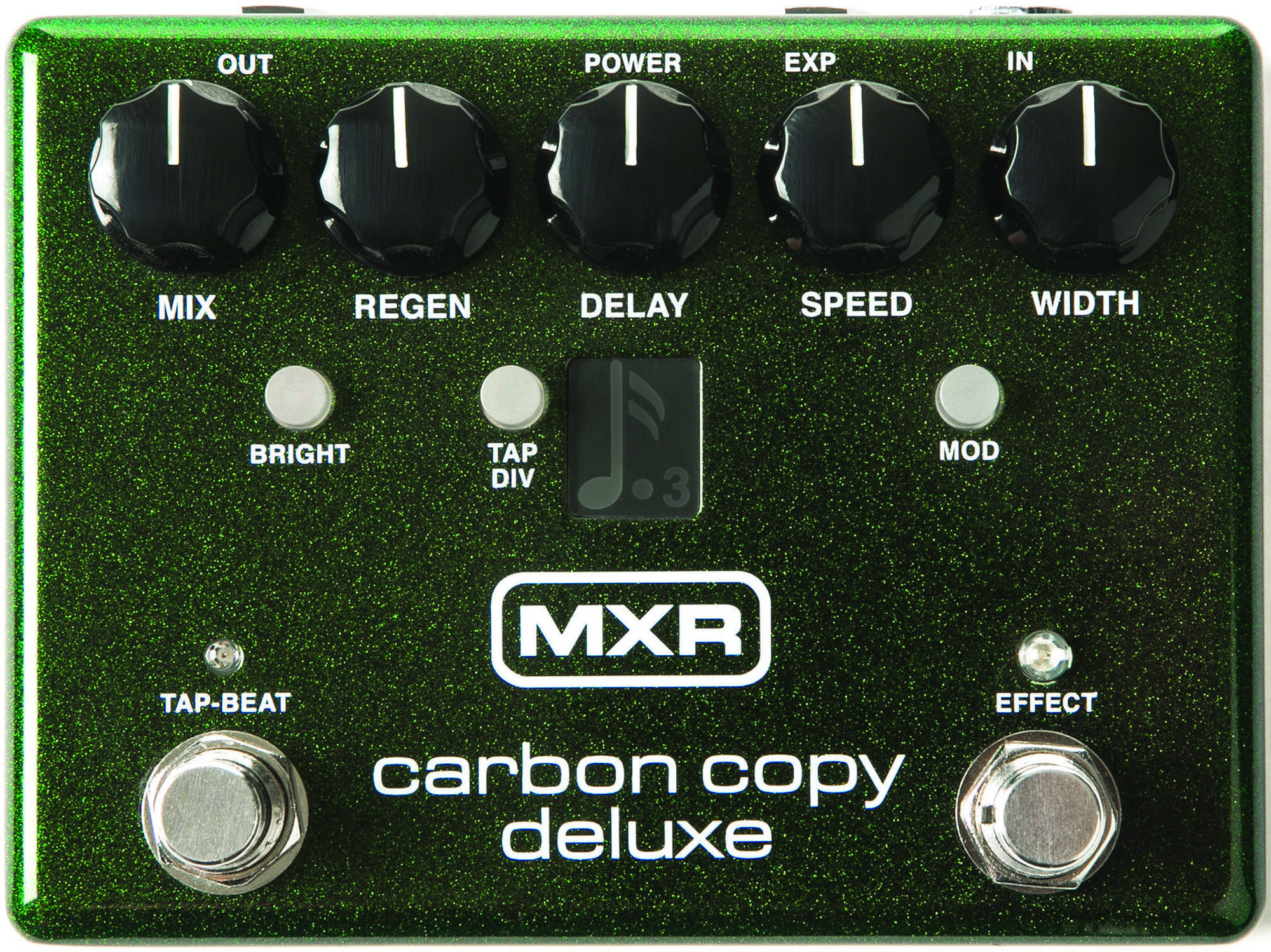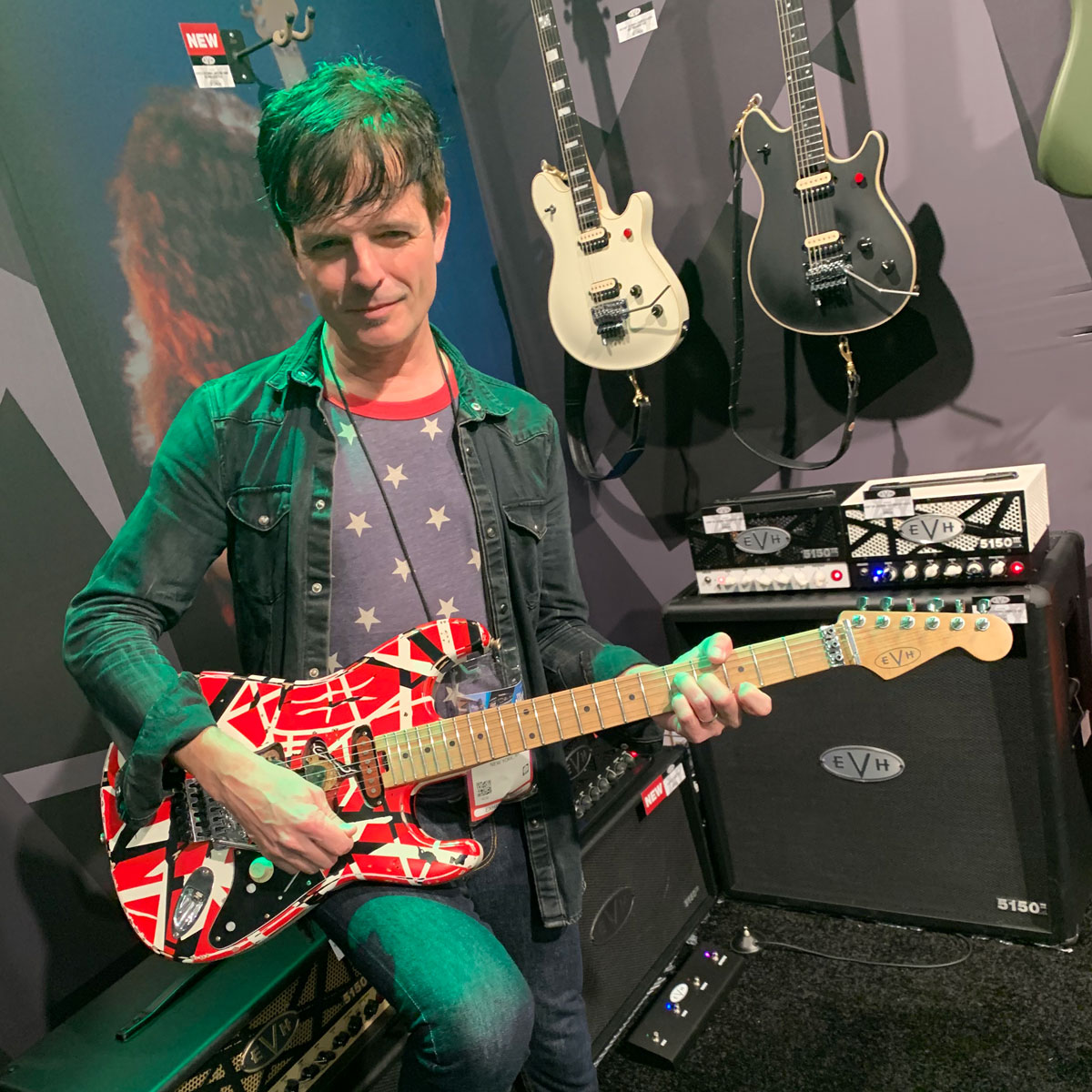Review: MXR Carbon Copy Deluxe Analog Delay

Since Its Introduction nearly 10 years ago, the MXR Carbon Copy Analog Delay is, by far, the best-selling delay pedal in the marketplace. With an analog bucket-brigade design, 600ms of darkly lush and organic delay with textured modulation on tap and an attractive price point, there’s no disputing this small green wonder’s undeniable popularity.
But it goes without saying guitarists always want more, whether it’s from a delay pedal or a narcissistic need for adulation. And while MXR can’t help with the latter, they know addiction is real, and the cure is to mainline that itchy echo fix by introducing the Carbon Copy Deluxe Analog Delay, a splendid update of the Carbon Copy that offers even more delay time, tap tempo functionality and loads of versatile features. And in case you’re still wondering, the Carbon Copy Deluxe retains all the analog warmth and musical character of the original pedal.
FEATURES
Most importantly, the Carbon Copy Deluxe features eight bucket-brigade chips under its hood and boasts 1200ms of delay—double the delay time of the Carbon Copy. The pedal comes in MXR’s compact wide housing to accommodate the multiple controls located on its top panel. The first three—Mix, Regen and Delay—handle the delay section, while the next two—Speed and Width—are for the modulation effect (a useful addition since the original’s trim pots were located internally).
Below the controls are push buttons for Bright (engages high-end frequencies found in the MXR Carbon Copy Bright Delay), Tap Div (selects between the tap tempo subdivisions indicated by brightly lit 8th, dotted 8th, triplets and 16th musical notes from the large LED screen adjacent to it) and Mod (modulation on/off). There also are footswitches for Tap-Beat (tap tempo) and Effect (on/off), with an orange LED above the Tap-Beat that flashes the tempo. There is a 1/4–inch expression pedal jack that unlocks numerous functions (such as sweeping between two presets and much more). A 9-volt battery powers the unit, but I’d implore you to use a 9-volt adapter for optimal efficiency and sound quality.
PERFORMANCE
What made the original Carbon Copy such a hit is its simplicity in design and dark wash of warmly repeated echoes. Here, the Carbon Copy Deluxe preserves all those beloved details, but is packaged in a far more vibrant and versatile analog delay with a tap tempo switch that's essential for quickly setting delay repeats. I urge anyone to really mess around with the Tap Div switch because I found myself toggling between different subdivisions that I normally wouldn’t choose as my initial delay setting. From warm slapback echo to prolonged delays awash in shaded ambience, the pedal sounds intoxicating in its deeply saturated repeats. Having the modulation controls on top allows for smoothly dialing in a syrupy chorus or warbled vibrato textures. The Bright mode is a nice inclusion for accentuating high end, but I actually preferred the pedal’s unadulterated darker tone. For its ace versatility and authentic echo, the Carbon Copy Deluxe is a benchmark among analog delays.
STREET PRICE: $229.99
MANUFACTURER: MXR, jimdunlop.com
- The Carbon Copy Deluxe has up to 1.2 seconds of delay, twice the delay time of the original Carbon Copy.
- The delay now includes a tap tempo footswitch and four different tap tempo subdivisions via a Tap Div switch and a bright LED status display.
● THE BOTTOM LINE
The Carbon Copy Deluxe Analog Delay adds tap tempo functionality, extended delay time, programmable presets, external modulation controls, a bright switch and so much more, all of which make it one of the most versatile and best-sounding analog delays.
Get The Pick Newsletter
All the latest guitar news, interviews, lessons, reviews, deals and more, direct to your inbox!
Paul Riario has been the tech/gear editor and online video presence for Guitar World for over 25 years. Paul is one of the few gear editors who has actually played and owned nearly all the original gear that most guitarists wax poetically about, and has survived this long by knowing every useless musical tidbit of classic rock, new wave, hair metal, grunge, and alternative genres. When Paul is not riding his road bike at any given moment, he remains a working musician, playing in two bands called SuperTrans Am and Radio Nashville.
“The original Jordan Boss Tone was probably used by four out of five garage bands in the late ’60s”: Unpacking the gnarly magic of the Jordan Boss Tone – an actual guitar plug-in that delivers Dan Auerbach-approved fuzz
“This is a powerhouse of a stompbox that manages to keep things simple while offering endless inspiration”: Strymon EC-1 Single Head dTape Echo pedal review










